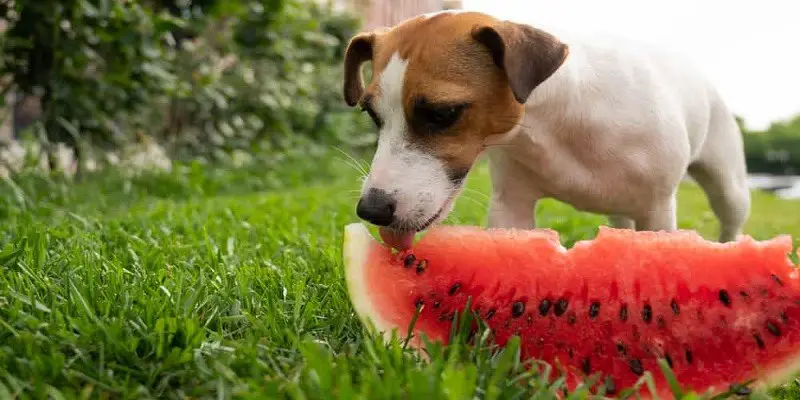Last Updated on May 10, 2025 by Pauline G. Carter
Watermelon is a popular summer fruit that many of us enjoy, and it’s also a healthy snack option for humans. But what about our furry friends? Can dogs eat watermelon, and is watermelon safe for dogs? As a pet owner, it’s important to understand what foods are safe for your dog to consume. In this article, we will explore everything you need to know about feeding watermelon to your canine companion.
Dogs and Watermelon
The first point is Can Dogs Eat Watermelon?
Yes, dogs can eat watermelon, and in fact, it can be a healthy treat for them. Watermelon is a good source of vitamins A, B6, and C, as well as potassium and fiber. It is also low in calories, which makes it an excellent option for dogs who are trying to maintain a healthy weight. However, it’s important to remember that watermelon should be given to your dog in moderation, as too much of it can lead to digestive problems.
Watermelon and dog safety
Watermelon is generally safe for dogs to eat, but there are a few things to keep in mind. First, you should always remove the rind and seeds from the watermelon before giving it to your dog. The rind can be difficult for dogs to digest, and the seeds can be a choking hazard or cause digestive problems.
Second, some dogs may have an allergy or sensitivity to watermelon, so it’s important to monitor your dog after giving them a small amount of the fruit for the first time. Signs of an allergic reaction include itching, swelling, vomiting, and diarrhea.
Benefits of Watermelon for Dogs
As mentioned earlier, watermelon is a good source of vitamins and minerals, making it a healthy snack option for dogs. In addition, the high water content of watermelon can help keep your dog hydrated on hot days. This is especially important for dogs who spend a lot of time outside or who are prone to dehydration.
Watermelon is also low in fat and calories, which makes it an excellent treat for dogs who are trying to maintain a healthy weight. You can even use watermelon as a low-calorie alternative to traditional dog treats, which are often high in calories and sugar.
How to Feed Your Dog Watermelon
Before giving your dog watermelon, it’s important to prepare it properly. Start by removing the rind and seeds from the fruit. You can then cut the watermelon into small, bite-sized pieces that are easy for your dog to chew and swallow. It’s also a good idea to start with a small amount of watermelon, especially if your dog has never had it before. This will help you to monitor your dog for any signs of an allergic reaction or digestive problems.
When feeding your dog watermelon, it’s best to give it to them as a treat rather than as a meal replacement. This is because watermelon is low in protein and other essential nutrients that your dog needs to stay healthy. As a general rule, treats should make up no more than 10% of your dog’s daily calorie intake.
Risks of Feeding Your Dog Watermelon
While watermelon is generally safe for dogs to eat, there are a few risks to be aware of. As mentioned earlier, the rind and seeds of the watermelon can be difficult for dogs to digest and may cause digestive problems. In addition, too much watermelon can lead to diarrhea, which can be uncomfortable and potentially dangerous for your dog.
Another risk of feeding your dog watermelon is that it may contain pesticides or other harmful chemicals. To minimize this risk, it’s important to choose organic watermelon whenever possible. If you’re unsure whether the watermelon you have is organic, it’s best to err on the side of caution and avoid giving it to your dog.
Conclusion
In conclusion, we know that watermelon is safe for dogs, and it can be a healthy treat for them when given in moderation. However, it’s important to remove the rind and seeds, monitor your dog for any signs of an allergic reaction or digestive problems, and choose organic watermelon whenever possible.
As with any new food, it’s always a good idea to consult with your veterinarian before introducing watermelon to your dog’s diet. By following these guidelines, you can safely give your dog a delicious and nutritious snack that they’re sure to love.

